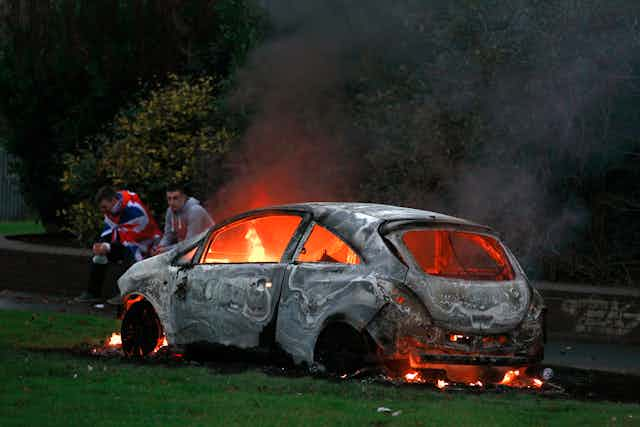The idea that people help one another more in times of adversity, especially when in conflict with other groups, certainly makes sense. A great example is the “Dunkirk spirit”, a phrase describing the effort of civilians in WWII who, at a great risk to themselves, evacuated British soldiers trapped by the German army on French beaches using a flotilla of small boats.
Despite the fact that rigorous evidence is still lacking, many anthropologists believe that war and conflict are indeed a driver of human cooperation. But our new study – investigating cooperation before, during and after sectarian riots between Catholics and Protestants in Belfast, Northern Ireland – suggests that conflict actually reduces cooperation, even towards members of your own group.
Violent past
From an evolutionary perspective, it is hard to explain how altruism came about. Selfish individuals should, in principle, have an advantage over altruists. However, cooperative behaviour is widespread in human societies. This could have been driven by a number of factors, including the realisation that altruistic behaviour somehow generated direct benefits to oneself, indirect benefits to close relatives or paybacks in future encounters.
Another popular and intuitively appealing solution is “cultural group selection”. This presumes that groups in which people are altruistic towards their fellow group members and hostile to outsiders are more likely to be victorious in conflicts between groups. Groups of selfish individuals would be more likely to be wiped out. The competition between groups would then cause traits that are costly to an individual but beneficial to their group – such as self sacrifice in warfare – to be selected and evolve. One study has claimed that there was enough warfare between different groups in the Late Pleistocene and early Holocene to enable such evolution.
But this view is controversial. Evolutionary forces tend to be stronger on traits that benefit individuals rather than groups. This is due to the possibility of selfish individuals invading and then taking advantage of altruistic groups.

In our study we took a different approach, looking at a present day conflict. We used an eruption of sectarian violence between Catholics and Protestants in Belfast in December 2012 to test this hypothesis. To estimate levels of cooperation within each group, we did an experiment involving donations to local primary schools, which were either Catholic or Protestant, or to a neutral charity. We had sampled several Belfast neighbourhoods before the riots began, so were able to sample some of them again during and after the riots to make a comparison over time.
In the donations experiment, we offered people £5 for their time spent answering a survey; we then allowed them to keep or donate that money to a local primary school, which was either a Catholic or Protestant school, or to a neutral charity (Save the Children). We predicted that exposure to hostility during the riots from another group would increase the level of donations towards one’s own group and reduce those towards the other group.
While we did find that donations that favoured the other group declined during the riots, we also found a similar decline in donations to their own group. Both bounced back about four months after the riots.
Barriers to cooperation
These results confirmed findings from our previous study looking at geographic variation in levels of sectarian conflict and altruism all over Belfast. This study showed that exposure to conflict did reduce the likelihood of donating to the other group’s schools, but nor did it have any effect on helping one’s own group’s schools or the neutral charity, either with donations or by returning lost letters.
Instead, we found that socioeconomic characteristics of both individuals and neighbourhoods were the best predictors of cooperation, with wealthy people and those in wealthy neighbourhoods more likely to donate money and return lost letters.

Our two studies demonstrate how adversity, either from conflict or deprivation, leads to the breakdown of cooperation and we find no evidence that conflict promotes cooperation. Any cooperative behaviour during conflict is perhaps more related to enhanced reputation and enforcement mechanisms (such as conscription and punishment) rather than pure altruism.
The idea of altruism originating from war is perversely attractive. Yet the empirical question of whether conflicts are, in fact, won because group members are more willing to sacrifice themselves for the good of the group has not been answered properly. Mathematical models neatly draw alternative accounts for the evolution of our unique cooperative tendencies. But only through fieldwork can we really settle whether benefits to the group or to the individual are the most important drivers of cooperation in the real world.

